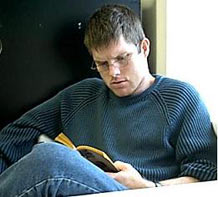 Sunday, April 24, 2005
Sunday, April 24, 2005
Trash it all: An Angioplasty for the Composer's Soul
In the past few months, everytime my pen connected with paper it always ended with mediocre results. It was not writer’s block exactly, because I was still composing. I just felt that what I was composing was not very good.
Over the past year, a few people have asked me for new works to which I reluctantly agreed to compose. I began to feel overwhelmed, and I ended up overextending myself.
I compose rather slowly. When writing, I allow myself to live with my compositional decisions for awhile before I decide if the material is worthy of the final product. So my writing process can be very drawn-out.
My compositional “to do list” was growing rapidly. I felt as if I was not composing for myself anymore. I guess I was composing to fill the desires of others instead of myself. I was writing uninteresting music for instrumental combinations that did not appeal to me. I had become extremely bored with what I was creating.
So I wiped the plate clean.
Then I took a while to think about my next undertaking. Now I have a couple new projects on my plate that are built on various ideas that have been lurking around in my head for quite awhile. Since I made the decision to clean house, ideas have flowed freely. It was as if whatever had been clouding my brain and blocking my thought processes had been expelled.
posted by Everette Minchew
9:11 PM
|
|
 Composer Everette Minchew (born 1977) is consistently active in the creation, performance, and promotion of contemporary music. Moderately prolific, his catalogue includes small chamber pieces for violin, piano, various wind instruments, harpsichord and electronic music. Current commissions include a string trio and an opera based on an 11th-century crusades tale.
His earliest musical training came at the age of eleven when he began playing alto saxophone; it wasn’t long until he began his first attempts in composition.
Composer Everette Minchew (born 1977) is consistently active in the creation, performance, and promotion of contemporary music. Moderately prolific, his catalogue includes small chamber pieces for violin, piano, various wind instruments, harpsichord and electronic music. Current commissions include a string trio and an opera based on an 11th-century crusades tale.
His earliest musical training came at the age of eleven when he began playing alto saxophone; it wasn’t long until he began his first attempts in composition.
He received a Bachelor’s Degree in Music History from the University of Southern Mississippi, where he studied saxophone under world-renowned soloist, Lawrence Gwozdz.
Fearing that traditional university training would hinder his development as a progressive composer, he abandoned the idea of formal lessons in favor of an intense private study of modern masterworks.
Minchew's works are characterized by their intense timbral explorations and brutal dissonance. That is not to say, however, that the compositions are devoid of beauty. In the first of the Two Brief Pieces, for example, the harpsichord chimes stringent yet haunting chords evoking a sense of loss.
Other pieces, like the Figment No. 2 "Juggler's Fancy" play upon the kaleidoscopic interaction between timbres and tones. The rapid alternation of pizzicato, arco bowing, and extreme glissandi remind the listener of Xenakis coupled with a Berio Sequenza. Minchew's Invention "Two-Part Contraption" for piano owes much to Ligeti's etudes and boogie-woogie jazz.
His music has been performed around the United States, and he was the featured composer at the 2005 Intégrales New Music Festival in Hattiesburg, Mississippi.
He currently resides in Hattiesburg, Mississippi with his wife, Cheryl.
CONTACT INFORMATION
| |



